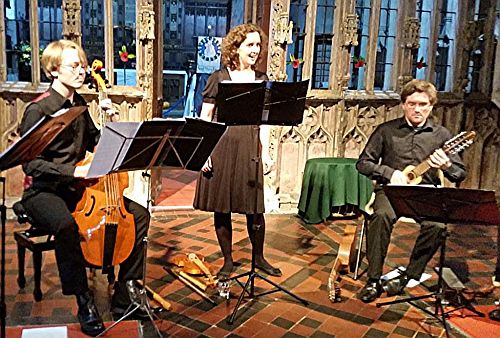 United Kingdom Music in the Age of Discovery: K’antu Ensemble [Ruth Hopkins (soprano, baroque violin, recorders), Sarah Langdon (alto, recorders), Michelle Holloway (alto, recorders), Ben Mitchell (tenor, baroque guitar, charango), Andrew Hopper (bass, viola da gamba), Tymoteusz Jozwiak (bass, percussion)], St Mary’s Church, Totnes, 31.10.2015 (PRB)
United Kingdom Music in the Age of Discovery: K’antu Ensemble [Ruth Hopkins (soprano, baroque violin, recorders), Sarah Langdon (alto, recorders), Michelle Holloway (alto, recorders), Ben Mitchell (tenor, baroque guitar, charango), Andrew Hopper (bass, viola da gamba), Tymoteusz Jozwiak (bass, percussion)], St Mary’s Church, Totnes, 31.10.2015 (PRB)

Juan del Encina: Amor con fortuna (Spain, 15th Century)
Anon: Dindirindin (Spain, 15th Century)
Gaspar Sanz: Canarios (Spain, 17th Century)
Anon: Pase el agoa (Spain, 15th Century)
Anon: Hanacpachap cussicuinin (Peru, 17th Century)
Anon: Bayle del Chimo – Bayle de Danzantes (Peru, 18th Century)
Anon: Tonada del Chimo (Peru, 18th Century)
Anon: Calabaça, no se buen amor (Spain, 15th Century)
Antonio de Salazar: Tarará qui yo soy Antón (Mexico, 17th Century)
Anon: Cachua a voz y bajo Al Naciemento de Christo Nuestro Señor (Peru, 18th Century)
Anon: Yo me soy la morenica (Spain, 16th Century)
Anon: Tonada la Lata (Peru, 18th Century)
Santiago de Murcia: Fandango (Spain/Mexico, 18th Century)
Anon: La Tricotea (Spain, 15th Century)
Diego Ortiz: Recercada segunda sobre ‘La Spagna’ – Recercada segunda (Spain, 16th Century)
Anon: Tonada el Conejo (Peru, 18th Century)
Gaspar Fernandes: Dame Albriçia mano Antón (Mexico, 17th Century)
Juan Aranés: Chacone (A la vida bona) (Spain, 17th Century)
Totnes is a market town at the head of the estuary of the River Dart in South Devon, in England’s South West, some twenty or so miles south of the county town of Exeter. It has a long recorded history dating back to AD 907, and today is a thriving centre for music, art, theatre – and natural health.
In 1999 Totnes Early Music Society (TEMS) was set up to offer historically-informed recitals in the genre, regularly bringing leading exponents and ensembles to the area. The town is also close to Dartington, acclaimed for its international Summer School held each August. While TEMS concerts are now given in association with The Arts at Dartington, it is a great tribute to the support of its informed audience base, and the indefatigable input from its administration team, that it continues to function so successfully in a niche market, that would otherwise have great difficulty in raising any significant support in the county’s largest conurbations many times the size of this thriving South Hams town.
Although it wasn’t an especially cold autumn evening, the church heating had only just switched on shortly before the performance was due to start. But within the space of a few bars, K’antu Ensemble had raised the temperature significantly with its programme of music from Spain and South America – and without a single llama, pan-pipe or poncho in sight helping to create the illusion.
Such was the constant enthusiasm and sheer energy of these six young multi-instrumentalists, that they very soon had everyone in the large audience responding to their music. However, the real Secret of the Incas was when they seamlessly broke into vocal harmony – uncomplicated, yet so perfectly-fashioned. In fact Hanacpachap cussicuinin (1631) – apart from providing the group with their name, ‘K’antu’ – apparently is the first-known piece of vocal polyphony to be printed in the New World.
Soprano Ruth Hopkins effectively led the ensemble with her attractive and totally idiomatic singing, as well as navigating her listeners through the programme by way of short, yet highly-informative spoken introductions, so vital in this fascinating yet little-heard material, sung in a variety of older forms of various indigenous languages. Physical texts weren’t provided, but Hopkins’ initial brief précis of the content, coupled with her sensitive delivery and body-language in performance always made the gist clear, even if not down to the exact specifics.
Indeed, it is always so refreshing – and avoids doing a disservice to any well-versed audience – when artists don’t feel the urge to repeat verbatim what is perfectly accessible in the programme notes. Conversely, it can often be equally as frustrating when there is copious and obviously helpful information in the notes, but where the house-lights are dimmed, and there is no spoken interaction from the performers. But Hopkins got it absolutely right and, of course, in such a programme where improvisation, fun and often bawdy texts are to the fore, it immediately breaks the ice, and makes for a real rapport with the audience.
With captivating performances from Michelle Holloway and Sarah Langdon (recorders), the tremendous rhythmic drive from baroque-guitarist and charango-player Ben Mitchell, solid bass-line and fine voice of Andrew Hopper (viola da gamba}, and inspired, yet never-overpowering percussion-playing from Tymoteusz Jozwiak, there were certainly far more tricks and treats here than you’d ever get at an average Halloween party – and certainly with more than enough intoxication to go round.
K’antu is a highly-entertaining ensemble of multi-instrumentalists-cum-singers, and which can be augmented when required. Even though it already has two CDs to its name, it is the simple enjoyment, enthusiasm and sense of real fun which these six young musicians – virtually still at the outset of their careers – exude, that makes this such a truly enjoyable experience.
Couple this with their individual skills and talents, and the relative exclusivity, yet immediate appeal of the product, they seem well on course for a long and fruitful association, and destined to make a telling contribution to their chosen field in the Early Music scene.
Philip R Buttall